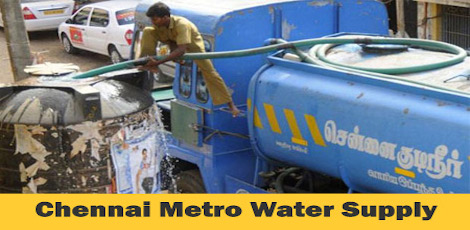Chennai Metropolitan Water Supply and Sewerage Board (CMWSSB) has launched a large-scale expansion project aimed at strengthening the city’s water distribution infrastructure. The project will extend the supply network by over 326 kilometres to provide uninterrupted, pressurised drinking water to more than 62,975 households and over 3,300 commercial units across two rapidly urbanising areas in southern Chennai.
The augmentation will be carried out under the Pallipattu and Thiruvanmiyur Water Distribution Systems (WDS), both critical nodes in the city’s expanding grid. The project will be implemented under the Hybrid Annuity Model (HAM) through a Public Private Partnership (PPP), executed on a Design, Build, Finance, Operate and Transfer (DBFOT) annuity basis. According to officials involved in the planning, this model has been selected to improve operational efficiency, deliver better service accountability, and reduce the financial burden on public exchequers through long-term private participation. A senior official from CMWSSB said the new infrastructure will not only support an additional 3 million litres per day (MLD) by 2036 but also plug several operational inefficiencies in the existing system. “The two WDS areas presently receive 50 MLD. However, our demand projection suggests this will rise to at least 53 MLD within a decade. The new distribution pipelines and smart management systems will ensure we can meet that surge while reducing leakage and wastage,” the official said.
The project’s scope includes a full assessment and overhaul of existing water supply assets. This will be done through a detailed technical survey by the appointed concessionaire, which will evaluate asset conditions, update consumer databases, develop hydraulic models of the network, and re-engineer the system for optimal performance. Advanced data analytics and IoT-enabled sensors are also expected to be embedded in the upgraded infrastructure to detect leaks, monitor pressure levels, and ensure equitable water distribution. According to documents floated for the bidding process, the private partner will be responsible for conducting due diligence and confirming the design elements specified in the project report. Emphasis will be placed on minimising non-revenue water (NRW)—water that is produced but lost due to theft, leakage or billing inaccuracies—which in some Chennai zones is estimated to be over 30%. A reduction in NRW is expected to substantially improve revenue collections and reduce the city’s reliance on external water sources during times of scarcity.
In addition to enhancing water availability, the infrastructure modernisation is geared towards improving sustainability and urban resilience. “We’re not just building more pipes—we’re building a smarter, leaner, and more accountable water system that prioritises equitable access and long-term resilience in the face of climate variability,” an official from the urban development department noted. Energy-efficient pumping stations, better metering systems, and consumer-level pressure regulators are planned as part of the new installations. This water network upgrade is particularly significant in light of Chennai’s long-standing water management challenges. Seasonal droughts, groundwater depletion, erratic monsoons, and over-reliance on tankers have all stressed the city’s water security. While the city has made advances in desalination and wastewater recycling, distribution inefficiencies have remained a major hurdle—especially in southern and peri-urban areas like Pallipattu and Thiruvanmiyur where population density is growing rapidly.
The areas set to benefit from the project include dense residential pockets and commercial zones around Thiruvanmiyur, Pallipattu, Besant Nagar, Indira Nagar, and parts of ECR and Adyar. Currently, several of these areas depend on alternate-day water supply or rely on costly tanker deliveries. With the completion of the new project, these households are expected to transition to daily, pressurised water supply—a major upgrade in quality of life and hygiene. Urban planners have also applauded the DBFOT approach, noting that such models allow cities to leverage private-sector expertise and capital while retaining public oversight. “HAM and DBFOT contracts offer structured payment schedules, incentivise long-term maintenance, and ensure that performance benchmarks are met,” said a Chennai-based infrastructure consultant.
The total implementation period for the water network expansion has been set at 730 days. Once operational, the system will be maintained by the private concessionaire for a fixed period, following which it will be handed over to the CMWSSB. The board is expected to begin groundwork in the coming weeks following final approvals. Environmental activists and civic groups have cautiously welcomed the move but warned that long-term water sustainability also depends on conservation. “This is a necessary step to improve delivery, but we must simultaneously invest in rainwater harvesting, aquifer recharge, and public education around responsible water use,” noted a member of a local water rights coalition.
With this strategic investment, Chennai continues to chart its course toward becoming a more liveable and climate-resilient urban centre. As city leaders seek to balance population growth with sustainability, initiatives like this signal a promising direction—one that places people, environment, and efficiency at the heart of civic infrastructure.
Also Read : Mumbai–Pune Return Flight Cancelled After Bird Strike


